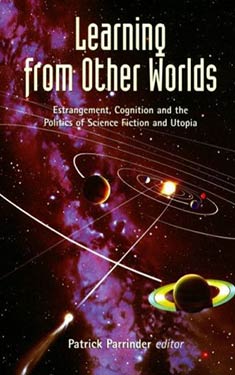
Added By: gallyangel
Last Updated: gallyangel
Learning from Other Worlds: Estrangement, Cognition, and the Politics of SF
| Author: | Patrick Parrinder |
| Publisher: |
Liverpool University Press, 1999 |
| Series: | |
|
This book does not appear to be part of a series. If this is incorrect, and you know the name of the series to which it belongs, please let us know. |
|
| Book Type: | Non-Fiction |
| Genre: | Science-Fiction |
| Sub-Genre Tags: | |
| Awards: | |
| Lists: | |
| Links: |
|
| Avg Member Rating: |
|
|
|
|
Synopsis
Learning from Other Worlds provides both a portrait of the development of science fiction criticism as an intellectual field and a definitive look at the state of science fiction studies today. Its title refers to the essence of "cognitive estrangement" in relation to science fiction and utopian fiction--the assertion that by imagining strange worlds we learn to see our own world in a new perspective. Acknowledging an indebtedness to the groundbreaking work of Darko Suvin and his belief that the double movement of estrangement and cognition reflects deep structures of human storytelling, the contributors assert that learning-from-otherness is as natural and inevitable a process as the instinct for imitation and representation that Aristotle described in his Poetics.
In exploring the relationship between imaginative invention and that of allegory or fable, the essays in Learning from Other Worlds comment on the field's most abiding concerns and employ a variety of critical approaches--from intellectual history and genre studies to biographical criticism, feminist cultural studies, and political textual analysis. Among the topics discussed are the works of John Wyndham, Kim Stanley Robinson, Stanislau Lem, H.G. Wells, and Ursula Le Guin, as well as the media's reactions to the 1997 cloning of Dolly the Sheep. Darko Suvin's characteristically outspoken and penetrating afterword responds to the essays in the volume and offers intimations of a further stage in his long and distinguished career.
This useful compendium and companion offers a coherent view of science fiction studies as it has evolved while paying tribute to the debt it owes Suvin, one of its first champions. As such, it will appeal to critics and students of science fiction, utopia, and fantasy writing.
Contents:
- 1 - Introduction (Learning from Other Worlds) - (1999) - essay by Patrick Parrinder
- 19 - Before the Novum: The Prehistory of Science Fiction Criticism - (1999) - essay by Edward James
- 36 - Revisiting Suvin's Poetics of Science Fiction - (1999) - essay by Patrick Parrinder
- 51 - 'Look into the Dark': On Dystopia and the Novum - (1999) - essay by Tom Moylan
- 72 - Science Fiction and Utopia: A Historico-Philosophical Overview - (1999) - essay by Carl Freedman
- 98 - Society after the Revolution: The Blueprints for the Forthcoming Socialist Society published by the Leaders of the Second International - (1999) - essay by Marc Angenot
- 119 - From the Images of Science to Science Fiction - (1999) - essay by Gérard Klein
- 127 - Estranged Invaders: The War of the Worlds - (1999) - essay by Peter Fitting
- 146 - 'A part of the... family [?]': John Wyndham's The Midwich Cuckoos as Estranged Autobiography - (1999) - essay by David Ketterer
- 178 - Labyrinth, Double and Mask in the Science Fiction of Stanislaw Lem - (1999) - essay by Rafail Nudelman
- 193 - 'We're at the Start of a New Ball Game and That's Why We're All Real Nervous': Or, Cloning - Technological Cognition Reflects Estrangement from Women - (1999) - essay by Marleen S. Barr
- 208 - 'If I find one good city I will spare the man': Realism and Utopia in Kim Stanley Robinson's Mars Trilogy - (1999) - essay by Fredric Jameson
- 233 - Afterword: With Sober, Estranged Eyes - (1999) - essay by Darko Suvin
- 272 - Checklist of Printed Items that Concern Science Fiction (with Utopian Fiction or Utopianism, and a few Bordering Items) - (1999) - essay by Darko Suvin
Excerpt
No excerpt currently exists for this novel.
Reviews
There are currently no reviews for this novel. Be the first to submit one! You must be logged in to submit a review in the BookTrackr section above.
Images
No alternate cover images currently exist for this novel.



















 Full Details
Full Details





